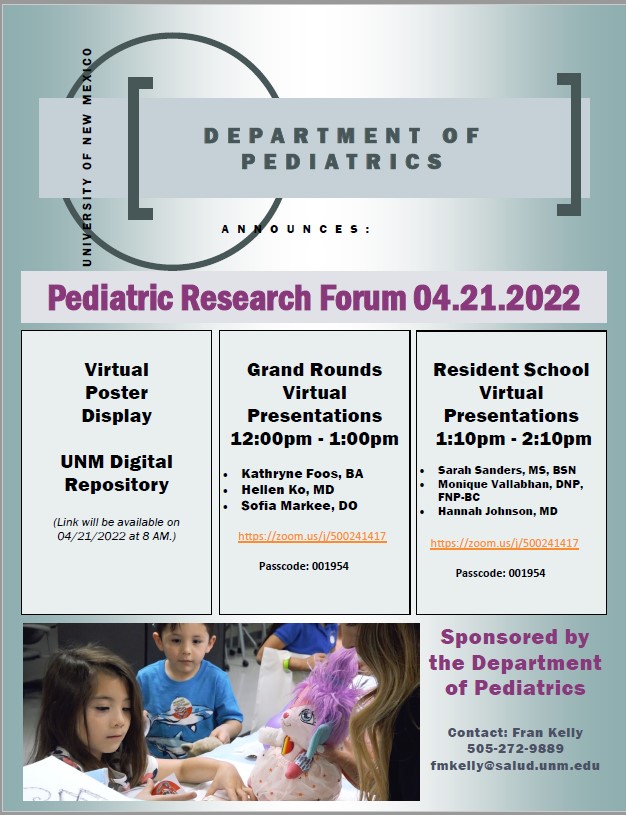
2022 Pediatric Research Forum Session
Document Type
Poster
Publication Date
4-21-2022
Abstract
Introduction:
Illnesses caused by coronaviruses have previously been shown to affect maternal and neonatal morbidity and mortality. Coronavirus disease 2019 (COVID-19) has been shown to affect vasculature including placental changes. As significant remodeling of the placenta occurs at the end of the first trimester into the second trimester, insults during this crucial period could affect placental functionality, with impact on fetal growth and well-being. Thus, we explored the relationship between antenatally-acquired maternal COVID-19 infection and birth characteristics.
Methods:
A retrospective chart review was completed using the University of New Mexico electronic medical record system. ICD-10 codes were used to identify women with a positive pregnancy test and positive COVID screening test between 3/1/2020 - 3/24/2021. Individuals with a positive pregnancy test and a negative or undocumented COVID test without symptoms were included as a comparison group. Chi-square and t-test analyses were used, with p<0.05 considered significant.
Results:
487 dyad charts were reviewed with 76 individuals identified as COVID-19 positive (CovPos) during pregnancy, one declined testing, and the remaining 411 were COVID-19 negative (CovNeg). More CovPos individuals identified as Native American than expected for the population (p<0.01). There was no difference in maternal age (p=0.46) or average birth weight (p=0.242). The incidence of cesarean section was significantly increased in CovPos cases (34%) compared to CovNeg individuals (19%; p<0.01). There was a significant difference in gestational age at delivery with infants of CovPos individuals born earlier (37.7 vs. 38.6 weeks; p<0.01). More infants born to CovPos individuals were admitted to units other than the nursery and was nearing significance (p=0.06).
Conclusion(s):
Our study suggests that there are differences in maternal and infant characteristics following COVID-19 infection during pregnancy. Additional investigations are required to further delineate these relationships with a focus on potential long-term impacts on the neonate.
Recommended Citation
Ko, Hellen; Katie Baille; Orrin Myers; and Jessie R. Maxwell. "The Impact of Coronavirus Disease 2019 on Maternal and Infant Characteristics in New Mexico." (2022). https://digitalrepository.unm.edu/hsc_2022_pediatric_research/18
